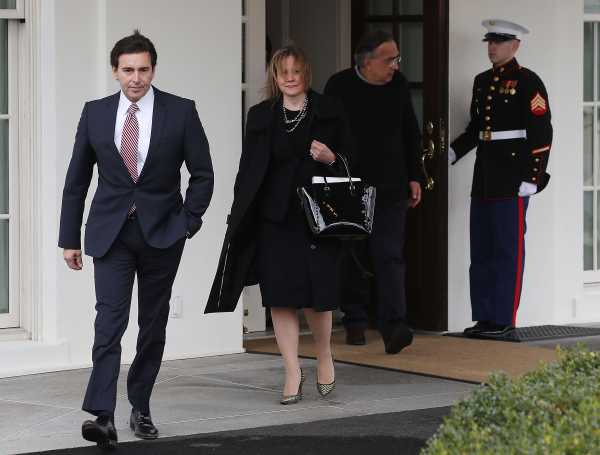
President Donald Trump on Tuesday threatened to retaliate against General Motors for its decision to shutter plants and slash jobs by cutting the automaker’s federal subsidies, including for electric cars. But he can’t act unilaterally to do it.
The president has become increasingly incensed publicly since GM said on Monday that it would make overhauls that would lead to $6 billion in cost reductions by 2020, including shuttering up to five plants in the US and Canada and slashing 15 percent of its salaried workforce, a total of some 14,700 jobs.
“We don’t like it,” Trump told reporters on Monday. He said that he told CEO Mary Barra, who met with National Economic Council Director Larry Kudlow regarding the decision, “You better get back in there soon.”
On Tuesday, Trump upped the ante even more, firing off a pair of tweets at GM.
“The U.S. saved General Motors, and this is the THANKS we get!” he wrote, before going on to say he was considering cutting GM’s electric car subsidies.
At a press briefing on Tuesday, Kudlow also said the administration would be “looking at certain subsidies for electric cars.”
Trump appears to have been referring to a $7,500 federal tax credit for consumers who buy fully electric cars. The credit currently phases out after an automaker sells 200,000 such cars. It originated in the 2009 stimulus bill and was extended in the 2017 Republican tax bill Trump signed last year.
Tesla already hit the 200,000-car mark in July. GM is expected to reach it by the end of the year, and actually, Tesla, GM, and Ford have been lobbying lawmakers to lift the cap or get rid of it altogether. Sens. Orrin Hatch (R-UT) and Dean Heller (R-NV) have also proposed raising the cap or extending the credit.
Trump now appears to want to do the opposite, but he can’t do it by himself.
“Trump would need Congress to pass legislation amending the IRS tax credits for electric vehicles that were in the tax reform passed last year,” Garrett Nelson, a senior equity analyst at research investment firm CFRA Research, told me. “They could conceivably do that.”
If Congress were to revise the electric vehicle tax credit, it would also likely have to change it entirely — not only focus on GM.
“Don’t imagine they can go back and single one company out in the tax code,” Clayton Allen, an analyst at research firm Height Capital Markets, said.
If Congress were to get rid of the electric vehicle tax credit, it would likely hurt GM more than it would hurt Tesla because of the way its cars are priced.
“If you look at the tax credit of a percentage of the total vehicle cost, it’s a lot higher,” Nelson said. “The Chevy Volt is what would be impacted, and it retails for between $30,000 and $35,000. It’s pretty significant.”
It’s not clear what additional subsidies for GM Trump might have been referring to.
Trump is testing the limits in terms of strong-arming corporate America
Trump has made a habit of singling out specific companies when they do things he doesn’t like, including Apple, Harley-Davidson, and Amazon. He seems to believe that he can force corporations to bend to his will, even when economics and policy say otherwise. GM is going to be another test of that.
On Tuesday, Kudlow said Trump felt a “tremendous amount of disappointment, maybe even spilling into anger” over GM, but wouldn’t weigh in on the merits of the automaker’s business moves.
“I have no idea if [Barra has] made the right decisions or the wrong decisions; it’s not my business,” he said.
Nelson told me that Trump’s tweets could indicate he believes he has the votes in Congress to roll back the electric vehicle credit entirely, perhaps with support from lawmakers from the states where GM is closing plants: Michigan, Ohio, and Maryland. But whether the president, who often shoots from the hip when it comes to his Twitter account, has been that calculating is unclear.
Trump’s tweets could also be an attempt at a negotiating tactic.
“I view the comments as more of a negotiating tactic to pressure GM to possibly convert the plants into producing other types of vehicles that are more in demand, such as SUVs and CUVs, and save those jobs,” Nelson said. “It’s worth noting that GM is also facing political pressure from [Canadian Prime Minister Justin Trudeau] and other elected officials to do so.”
Whether there’s any substance behind Trump’s threats remains to be seen.
Sourse: vox.com






